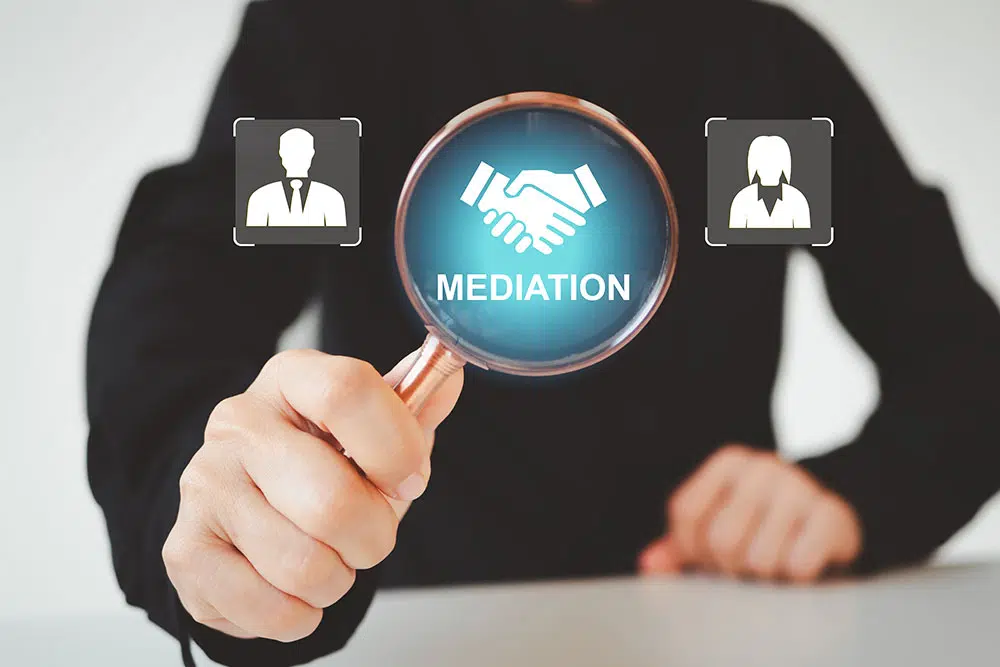11 Nov Top 6 Strategies For Successful Mediation In Family Law

In this article, you can discover…
- How to prepare for a mediation session.
- What documents to bring along to mediation.
- The important role of communication in a successful medication.
How Should I Prepare For A Mediation Session?
Before you head into mediation, be sure to meet with an attorney. Understand what your rights are and have a clear strategy in place for mediation. Discuss your goals, hopes, and concerns with your lawyer, who can help you better understand what to expect, what to say, and what not to say.
It’s important to go into mediation with a clear sense of what you would like your life to look like post-divorce. What would you like to see done with the family house? What kind of alimony payment amounts are you hoping to receive?
Your attorney can also help you compile the necessary documents and protect your legal interests during the mediation process. The better prepared you are, the more time, money, and stress you can save yourself in the long run.
What Documents Should I Bring To My Mediation In New Jersey?
When I work with clients heading into mediation, I have them prepare a statement that outlines their entire financial life. This statement will include where you work, what you earn, what your employee benefits are, your costs of daily living, your assets, and your liabilities.
This document, which will later be required by the court as a sworn document, will help serve as a vital roadmap to help negotiate spousal support, child support, and equitable distribution.
Along with this document, I ask my clients to gather several years’ worth of tax returns, recent pay stubs, bills, mortgage statements, credit card statements, bank statements, and any other financial documents they may have.
If you have a closely held business, bring records for that business. This can include backup data used by your accountant to prepare the business’ annual tax returns. The more financial material your attorney has access to, the better they can help you negotiate for a fair outcome in mediation.
How Can I Communicate Effectively During Mediation?
The most important aspect of communicating effectively during mediation is honesty. Let the mediator know your thoughts, concerns, and goals for tangible assets. For example, if you would like to hold on to a vacation cabin or a specific piece of artwork, be clear about this.
When discussing money, it’s always best to refrain from mentioning the specific dollar amounts or benefits you’re seeking. This allows you to begin by negotiating high and moving forward toward a goal that both parties can agree on.
Be direct, be honest, and share your thoughts. If you don’t voice your concerns, it’s easy to feel as though you’re not being listened to. Remember, the mediator doesn’t understand your backstory, the history of the marriage, or your goals ahead of time. Help them understand through honest communication and letting them know what is important to you.
What Role Does Compromise Play In Successful Mediation?
Compromise is incredibly important. Remember, mediation is not the same as a judge handing down a decision. The mediator is there to help you negotiate a decision, and if you’re not willing or able to compromise, you can’t settle a case and move forward.
For example, say you insist on receiving $5,000 a month in spousal support, and the other party offers you $3,000. If you’re unwilling to budge, negotiations can not move forward. In a successful mediation, no one gets what they originally wanted, but both parties get something they can live with.
Refusing to budge and refusing to give and take wastes everybody’s time: yours, the mediator’s, and the other party’s. You’re also wasting money, money that would be better spent on your family and on rebuilding your life after the divorce.
How Can I Prioritize My Goals During Mediation?
Take a step back before you head into mediation and ask yourself, “What’s important to me?” For example, do you want to keep the family house, and to what measures will you go to keep that house?
When you weigh what is important to you, you can better understand what you might be willing to part with to keep what matters. What do you want your life to look like post-divorce? What is most meaningful to you, and what can you live without?
You can’t achieve your goal of holding on to what is important to you if you can’t define it for yourself. Set down your goals and plans before you head into mediation, and you’ll be far better equipped to negotiate successfully and move forward unencumbered.
What Are The Pitfalls To Avoid In New Jersey Family Law Mediation?
One of the biggest pitfalls is heading into mediation without an attorney. No matter how educated or bright you are, it’s easy to be bullied, pushed around, and steamrolled during mediation. When you don’t understand your rights, you can’t stand up for them.
An attorney will advocate for you, help you negotiate successfully, and prevent the other party from bullying you out of a fair settlement. Abuse patterns that emerge in marriage often play out during mediation, and it’s important to have a firm legal voice standing up for you to prevent this abuse.
Remember, this mediation and the agreement hammered out thereby becomes a court order. And that’s it. You’re obligated to follow that court order, so it’s best to ensure the order is fair and prudent.
A strong legal advocate can fight for you and your children, take emotional punches on your behalf, and help you exit mediation with far better prospects and a brighter future in sight.
Still Have Questions? Ready To Get Started? For more information on Strategies For Successful Mediation In Family Law, an initial consultation is your next best step. Get the information and legal answers you are seeking by calling (201) 257-9902 today.



